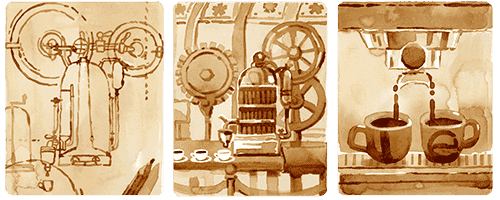Did you search for
anything in Google this morning – for sure, would have observed an interesting Google
Doodle – on an equipment and in honour of a man who presented his invention at the General Expo of
Turin in 1884, where it was awarded the bronze medal. The patent was awarded
for a period of six years on 16 May 1884 under the title of "New steam
machinery for the economic and instantaneous confection____________ The
machine was actually built by a mechanic named Martina, working under the
direct supervision of the inventor.
How do
you start your day daily ? In South
Indian culture, the visitor to a House is welcomed and offered a tumbler of
coffee. It is an energizer, many have
the habit of taking a cup of coffee immediately after consuming their food,
especially tiffin items. It is common to
see people walking to restaurants / hotels and order a cup of coffee. For most Indians, especially South Indians,
the day begins with a coffee in the morning and perhaps at least two more
during the day. At home, it is not simply Coffee, but Filter coffee –
made from decoction dripping down from
coffee powder made of dark
roasted coffee beans, chicory – the hot water percolates through the thick
powder solely by gravity and not under pressure. To this decoction, is added milk, enough not
to change the colour and aura. The fresh
coffee beverage literally wakes you up and makes you open to the day’s
realities. It has a stimulating effect
on people due to its caffeine content and is the most consumed beverages of the
World.
Coffee berries, which
contain the coffee seeds, are produced by several species of a small evergreen
bush of the genus Coffea. The two most commonly grown are also the most highly
regarded Coffea arabica, and the "robusta" form of the hardier Coffea
canephora. South Indian coffee (a.k.a
filter coffee) is a milk coffee (perfect example of South Indians' affinity for
dairy products).
In Malls,
theatres, elsewhere you would have taken ‘Espresso coffee’. Espresso (eˈsprɛsso]) is a coffee-brewing
method of Italian origin, in which a
small amount of nearly boiling water (about 90 °C or 190 °F) is forced under
9–10 bars (900–1,000 kPa; 130–150 psi) of pressure through finely-ground coffee
beans. Espresso coffee can be made with a wide variety of coffee beans and
roast degrees. Espresso is
generally thicker than coffee brewed by other methods, with a viscosity similar
to that of warm honey. This is due to the higher concentration of suspended and
dissolved solids, and the crema on top (a foam with a creamy consistency). As a result of the pressurized brewing
process, the flavors and chemicals in a typical cup of espresso are very concentrated.
Espresso has more caffeine per unit
volume than most coffee beverages, but because the usual serving size is much
smaller, the total caffeine content is less than a mug of standard brewed
coffee.
Once upon
a time, in 19th century Italy, coffee was the hottest item around.
Unfortunately, brewing methods required customers to wait over five minutes to
get their drink. Enter Angelo Moriondo, the man who patented the first known
espresso machine. Today’s Doodle celebrates his 171st birthday.
Moriondo was born this
day in Turin, Italy to a family of
entrepreneurs who never stopped brewing new ideas or projects. His grandfather
founded a liquor production company that was passed down to his son, who
himself would later build the popular chocolate company, “Moriondo and
Gariglio” alongside his brother and cousin. Following in his family’s footsteps, Moriondo
purchased two establishments: the Grand-Hotel Ligure in the city-center Piazza
Carlo Felice and the American Bar in the Galleria Nazionale of Via Roma.
Despite coffee’s popularity in Italy, the time spent waiting for coffee to brew
inconvenienced customers. Moriondo figured that making multiple cups of coffee
at once would allow him to serve more customers at a faster pace, giving him an
edge over his competitors.
After directly
supervising a mechanic he enlisted to build his invention, Moriondo presented
his espresso machine at the General Expo of Turin in 1884, where it was awarded
the bronze medal. The machine consisted of a large boiler that pushed heated
water through a bed of coffee grounds, with a second boiler producing steam
that would flash the bed of coffee and complete the brew. He received a patent
titled, "New steam machinery for the economic and
instantaneous confection of coffee beverage, method ‘A. Moriondo’."
Moriondo continued to improve and patent his invention in the following years.
Today's
Google doodle, which has been created by Olivia When features a GIF of the
first known espresso machine and is a tribute to the inventor Angelo Moriondo
on his 171st birth anniversary. Interesting
read as you sip a cup of pipingly hot coffee
6th June 2022
.jpg)

Good👍 one....
ReplyDeleteNow I too going to have a ☕☕of coffee after reading your article